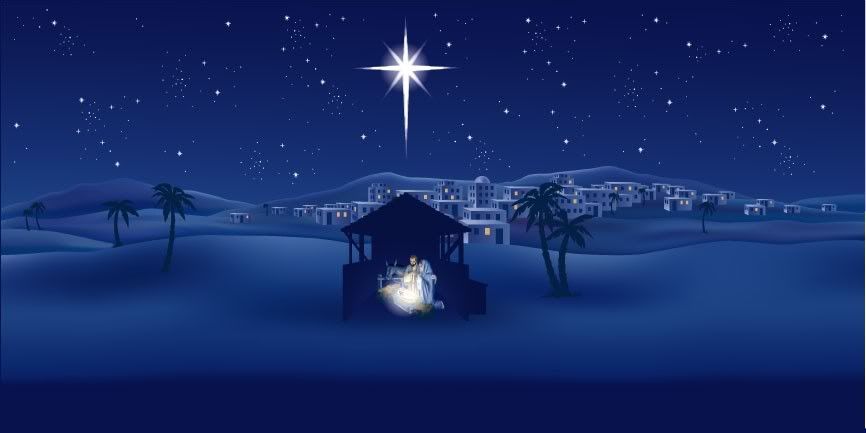Wednesday, December 31, 2008
A Taste of Honey...and More
Toni Braxton's Unbreak My Heart
and old Blue Eyes.....
A Very Happy New Year To You & Yours
Anyhow, our main mission being not be be gainfully employed so much as to minister to the online flock of Our Lord Jesus Christ, lost sheep or found ones, we wish you a blessed and wonderful New Year. May you and yours fulfill your destiny, grow in peace joy and love, and draw closer to the numinous mystery of the Incarnate Word.

St. John 1:1-14
In the beginning was the Word, and the Word was with God, and the Word was God. 2 The same was in the beginning with God. 3 All things were made by him: and without him was made nothing that was made. 4 In him was life, and the life was the light of men. 5 And the light shineth in darkness, and the darkness did not comprehend it.
6 There was a man sent from God, whose name was John. 7 This man came for a witness, to give testimony of the light, that all men might believe through him. 8 He was not the light, but was to give testimony of the light. 9 That was the true light, which enlighteneth every man that cometh into this world. 10 He was in the world, and the world was made by him, and the world knew him not.
11 He came unto his own, and his own received him not. 12 But as many as received him, he gave them power to be made the sons of God, to them that believe in his name. 13 Who are born, not of blood, nor of the will of the flesh, nor of the will of man, but of God. 14 And the Word was made flesh, and dwelt among us, (and we saw his glory, the glory as it were of the only begotten of the Father,) full of grace and truth.
~ Deborah Yost
Gabriel Stanford Espedal
The Rosemary Tree
Tuesday, December 30, 2008
A Brief Chronology of the Life of Christ
The dates have been determined in the following manner: First, Saint Luke tells us that John the Baptist was conceived after Zechariah's priestly service during the Course of Abijah. We know from the Qumran Calendar contained in the Dead Sea Scrolls the exact times at which each of the 12 priestly families ministered in the Temple of Jerusalem. (See 1 Paralipomenon / 1 Chronicles 24, 7-18). The family of Abijah, of which Zechariah was a descendant, was required to officiate on the days 8-14 of the third month, and on the days 24-30 of the eighth month. This latter period fell at about the end of our September. With good reason the Byzantine calendar celebrates John's conception on September 23, and his birth nine months later, on June 24. Beginning with this, it is clear that when Gabriel came to Mary "in the sixth month," (Luke 1: 26) this was late March. The Church has always held March 25 as the date of the Annunciation; the incarnation of Our Lord. Jesus' birth took place nine months later to the day - a sign of his divine perfection - on Sunday, December 25.
Why 5 B.C.? We know from Josephus' Antiquities and other sources that Herod the Great died in the year now computed as 4 B.C. Hence our Lord must have been born before that time. The exact year of the census mentioned by St. Luke remains uncertain. However, if we assume the birth of Our Lord to have been born in 5 B.C., it fits well with the following considerations: that Jesus' baptism was when he was "about thirty years old" (Luke 3: 23); that Jesus' earthly life was thirty-three years (a universal tradition); and that he died in A.D. 30, exactly 40 years before the destruction of Jerusalem in A.D. 70.
As for the year of Jesus' baptism, Saint Luke tells us that John began to preach and baptize "in the fifteenth year of the reign of Tiberius Caesar" (Luke 3: 1). Tiberius began his joint rule with Augustus in the Fall of A.D. 12; hence the fifteenth year would be from the Fall of A.D. 26 to the Fall of A.D. 27. Jesus was baptized well after John had begun his work. Tradition designates January 6 as the date of the baptism of Christ. This would then be in January A.D. 28. The 40 days in the wilderness would take us to February 25. This leaves time for the calling of the first disciples and the wedding at Cana prior to the first Passover mentioned by St. John (2: 13).
Saint John refers to three Passovers as the time structure within which Jesus fulfilled his work (John 2: 13; 6: 4; 11: 55). Thus the first was of A.D. 28, the second of A.D. 29, and the third of A.D. 30, when Jesus, at age 33, suffered his Passion and rose from the dead.
Finally, it was a common belief of the Fathers of the Church that Our Lord Jesus Christ died on the same day that He was conceived, March 25. Assuming this to be the truth, all the events from Palm Sunday to Pentecost may be dated with certainty.
September 23, 6 B.C. -- John the Baptist conceived, after Zechariah sees the Archangel Gabriel while executing his priestly office in the Course of Abijah.
Friday, March 25, 5 B.C. -- Jesus conceived by the Holy Spirit and the Virgin Mary at the Annunciation.
April 2, 5 B.C. -- Mary arrives at the home of Zechariah and Elizabeth in Ain Karim "in the hill country of Judea." John the Baptist sanctified in the womb. Mary proclaims the Magnificat.
June 24, 5 B.C. -- John the Baptist born. Zechariah proclaims the Benedictus.
July 2, 5 B.C. -- Following John’s circumcision, Mary departs to her home in Nazareth.
Sunday, December 25, 5 B.C. -- Jesus is born of the Virgin Mary in the Cave of Bethlehem. Angelic host sings Gloria in Excelsis to shepherds.
Sunday, January 1, 4 B.C. -- The Eighth Day: Jesus is circumcised.
February 2, 4 B.C. -- Jesus' Presentation in the Temple. The Ancient Simeon proclaims Nunc Dimitis and prophesies to the Holy Virgin: "Thy own soul a sword shall pierce."
Unknown date, early in 4 B.C. -- the Magi arrive in Bethlehem and pay homage to the newborn King of the Jews; upon their departure the Holy Family takes flight into Egypt, escaping the wrath of Herod. (Speculative date for the visit of the Magi: February 12, the 50th day after the Nativity, an anticipation of Pentecost.)
Unknown date, Spring of 4 B.C. -- Herod the Great dies. The Holy Family returns "out of Egypt" to Nazareth.
Passover, A.D. 9 -- Jesus, age 12, remains behind in Jerusalem; after three days Mary finds him in the Temple among the teachers.
January 6, A.D. 28 -- Jesus, age 31, is baptized by John in the Jordan. The Mystery of the Trinity is revealed. Jesus immediately goes into the Judean wilderness for 40 days.
March, A.D. 28 -- Jesus calls his first disciples; he performs his first miracle, changing water into wine at the wedding in Cana.
Passover, A.D. 28 -- Jesus appears in the Temple and cleanses it for the first time. He proclaims to Nicodemus the absolute necessity of Baptism for entrance into his Church, the Kingdom of God on earth (John 3: 3-5).
Passover, A.D. 29 -- Activity in Jerusalem uncertain. Shortly before this Passover, Jesus delivers the Bread of Life discourse on the Eucharist in the synagogue at Capharnaum (John 6)
Passover, A.D. 30 – The Passion Week:
Sunday, March 20 -- Jesus, age 33, enters Jerusalem in triumph. He cleanses the Temple for the second time.
Thursday night, March 24 -- Jesus institutes the Eucharist. He suffers his Agony in the Garden of Gethsemane.
Friday, March 25 -- Jesus is crucified and dies for the sins of the world. He is buried in Joseph of Arimathea's tomb.
Saturday, March 26 -- Jesus' body rests in the tomb; his spirit descends into hell (the part known as Abraham’s bosom) to proclaim release to the Old Testament Faithful.
Sunday, March 27 -- Jesus rises in glory and appears to his Mother, the ointment-bearing women, and the disciples.
Thursday, May 5 -- Jesus ascends into heaven, having commanded the disciples to baptize and teach all nations. The Old Testament Faithful enter into heaven behind him.
Sunday, May 15 -- Pentecost. Jesus sends the Holy Spirit to the disciples gathered in Solomon's Porch of the Temple. The Church, led by Peter, begins with a harvest of three thousand souls baptized.
Monday, December 29, 2008
Busy Monday...
Sunday, December 28, 2008
Friday, December 26, 2008
Selfishness Decried by Benedict XVI
By FRANCES D'EMILIO
VATICAN CITY (AP) - QUOTE Pope Benedict XVI in his Christmas message Thursday warned that the world was headed toward ruin if selfishness prevails over solidarity during tough economic times for both rich and poor nations.
Speaking from the central balcony of St. Peter's Basilica on the day Christians commemorate Jesus' birth in Bethlehem, Benedict declared that the "heart of the Christian message is meant for all men and women."
The traditional papal Christmas Day message "Urbi et Orbi" - Latin for "to the City and to the World" - usually covers the globe's hot spots, but this year Benedict also addressed the gloomy economic conditions worrying many across the planet.
Amid near daily news of layoffs, failing companies and people losing homes they can no longer afford in many parts of the world, Benedict's words seemed tailored in part to the global economic crisis.
He said his Christmas message also applied to "wherever an increasingly uncertain future is regarded with apprehension, even in affluent nations."
"In each of these places may the light of Christmas shine forth and encourage all people to do their part in a spirit of authentic solidarity," Benedict said. "If people look only to their own interests, our world will certainly fall apart." UNQUOTE
Entire text of Pope Benedict's Urbi et Orbi 2008 Christmas message here.
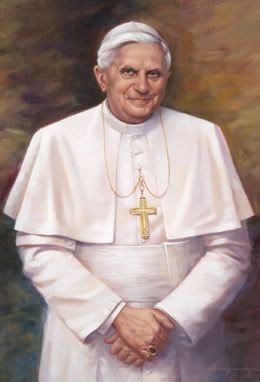
art credit: Jimbone79
Christmas Messages, Here and There
Blessed Are the Thrifty...
Be sure and click on over and read the whole thing ~
From John Zmirak at Taki's magazine:
QUOTE People say that the best cure for a hangover is a hair of the dog that bit you. The people who say that are typically alcoholics. They’re using the logic of an addict, whose reason has been fried by a short-circuit in the pleasure-centers of the brain. Such people think it’s funny when they fall down at a parish Christmas party (even if they’re the Monsignor), when they puke on your champagne colored carpet (“Good thing that’s what I was drinking!”), when they shout some slur that gets you into a fight with numerous ethnic strangers—and they’ll probably think it’s funny when, one morning in the shower, their liver slides out of their ass.
And that, boys and girls, is what happened to our economy. As it lies there on the porcelain, we want to pick it up and put it back but we’re scared it might just dissolve. Anyway, the process would probably hurt. Do we really need it?
But that’s really what it means, when the Magi of either party discuss the need for an “economic stimulus,” or financial journalists worry about the decline in consumer spending—by consumers who are losing their jobs. Just to break things down: This winter our country crashed into a wall because of our addiction to spending money we haven’t got for stuff we don’t need. We overdosed, ran through our stash, and now we’re thrashing around in a cold turkey withdrawal—but here comes that nice man with the methadone…. UNQUOTE
Wednesday, December 24, 2008
O Holy Night
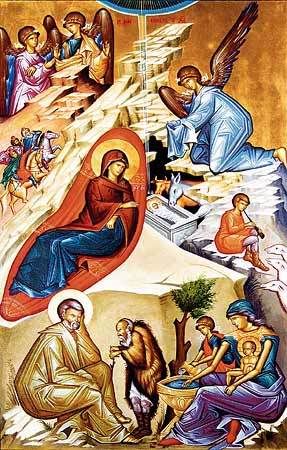
Christ is Born! Glorify Him!
THE NATIVITY SERMON OF SAINT JOHN CHRYSOSTOM
I behold a new and wondrous mystery!
My ears resound to the shepherd’s song, piping no soft melody, but loudly chanting a heavenly hymn!
The angels sing! The archangels blend their voices in harmony!
The cherubim resound their joyful praise! The seraphim exult His glory!
All join to praise this holy feast, beholding the Godhead here on earth and man in heaven. He who is above now, for our salvation, dwells here below; and we, who were lowly, are exalted by divine mercy.
Today Bethlehem resembles heaven, hearing from the stars the singing of angelic voices and, in the place of the sun, witnessing the rising of the Sun of Justice!
Ask now how this was accomplished, for where God wills the order of nature is overturned. For He willed He has the power. He descended. He saved. All things move in obedience to God.
Today, He Who is born. And He Who Is becomes what He was not. For when He was God, He became man - while not relinquishing the Godhead that is His.
And so the kings have come and they have seen the heavenly King that is come upon the earth, not bring with Him angels, nor archangels, nor thrones, nor dominations, nor powers, nor principalities, but treading a new and solitary path, He has come forth from a spotless womb.
Yet He has not forsaken His angels, nor left them deprived of His care, nor because of His incarnation has He ceased being God.
And behold the kings have come that they might serve the Leader of the Hosts of Heaven;
Women, so that they might adore Him Who was born of a woman so that He might change the pains of child birth to joy;
Virgins, to the Son of the Virgin . . .
Infants that they might adore Him Who became a little child, so that out of the mouths of infants He might perfect praise;
Children, to the Child Who raised up martyrs through the rage of Herod;
Men to Him Who became man hat He might heal the miseries of His servants;
Shepherds to the Good Shepherd Who has laid down His life for His sheep;
Priests, to Him Who has become a High Priest according to the order of Melchisidech;
Servants to Him Who took upon Himself the form of a servant that He might bless our stewardship with the reward of freedom;
Fishermen to the Fisher of humanity;
Publicans, to Him Who from among them named a chosen evangelist;
Sinful women to Him Who exposed His feet to the tears of the repentant woman;
And that I may embrace them all together, all sinners have come, that they might look upon the lamb of God Who takes away the sins of the world!
Since, therefore, all rejoice, I too desire to rejoice! I too wish to share the choral dance, to celebrate the festival!
But I take my part, not plucking the harp, nor with music of the pipes nor holding the torch, but holding in my arms the cradle of Christ!
For this is all my hope! This is my life! This is my salvation! This is my pipe, my harp!
And bearing it I come, having from its power received the gift of speech, I too, with the angels sing: "Glory to God in the Highest," and with the shepherds: "and on earth peace to men of good will."
~~~
Tuesday, December 23, 2008
Kustler's Latest Rant
QUOTE Zounds! Public sentiment toward the accelerating economic fiasco has shifted, seemingly overnight, from a mood of nauseated amazement to one of panicked grievance as the United States moves closer to an apparent comprehensive collapse -- and so ill-timed, wouldn't you know it, to coincide with the annual rigors of Santa Claus. The tipping point seems to be the Bernie Madoff $50 billion Ponzi scandal, which represents the grossest failure of authority and hence legitimacy in finance to date in as much as Mr. Madoff was a former chairman of the NASDAQ, for godsake. It's like discovering that Ben Bernanke is running a meth lab inside the Federal Reserve. And out in the heartland, of course, there is the spectacle of Illinois governor Rod Blagojevich trying to desperately dodge a racketeering rap behind an implausible hairdo. UNQUOTE
Did Saint Joseph Doubt Our Lady's Virginal Conception of Christ?
18 Now the generation of Christ was in this wise. When as his mother Mary was espoused to Joseph, before they came together, she was found with child, of the Holy Ghost. 19 Whereupon Joseph her husband, being a just man, and not willing publicly to expose her, was minded to put her away privately. 20 But while he thought on these things, behold the angel of the Lord appeared to him in his sleep, saying: Joseph, son of David, fear not to take unto thee Mary thy wife, for that which is conceived in her, is of the Holy Ghost. (Douay Rheims Version)
One of the most commonly held interpretations of this account is that Joseph did not understand that his betrothed was with child by the Holy Spirit, and therefore resolved to send her away secretly in order to spare her life and save his honor.
I used to hold this interpretation. Here is part of a sermon I preached on this text:
Joseph was bewildered when he found out that Mary was with child...he stumbled in unbelief concerning her condition. Why? Because in this situation Joseph judged by man made standards of wisdom. By these standards he knew that a woman gets to be with child by a man. And he knew the man was not him. It seemed impossible - downright foolish - to think that God had given her this child without a man. It may be hard for us to understand Joseph's problem. That's because we know all the facts of the case. We know that Mary remained a virgin and was with child of the Holy Ghost. Joseph didn't know that. What was he to think? What would you think if you learned your bride-to-be was pregnant? Would you have said, "How wonderful, thank you, Lord"?
Some Catholic interpreters also share this opinion. A footnote to verse 19 in the Confraternity New Testament (1941) reads, "Supposing only a natural explanation of her condition, Joseph, as just, might not proceed to marriage before the law, while his conviction of her innocence made him unwilling to expose her to reproach."
Nowadays I repudiate this interpretation, commonly held though it is.
Those who think that Joseph temporarily doubted Mary's virginal conception of Jesus will say that the clause "She was found with child of the Holy Ghost" is an anacoluthon, abandoning the straightforward narrative to give the reader the end of the story from the beginning.
But what happens if you read it as a straightforward narrative? In that case, you realize that when Joseph was informed of the source of Mary's pregnancy being the power of the Holy Spirit, he was firmly convinced of the truth of it. He understood and believed when she told him that her condition was the divine fulfillment of the prophecy of Isaiah (7: 14): "Behold, the virgin shall conceive and bear a son." Now that fits much better with what we are told of Joseph, that he was a just man. But how can one be just, or righteous in the sight of God unless he believes all that God has revealed? The whole point of the apostolic reading from the 11th chapter of Hebrews is that the ancients were just through their faith. Hence it seems far better to take verse 19 as part of a simple narrative, and understand that Joseph believed his betrothed to have conceived supernaturally.
Another consideration which faithful Catholics and Orthodox cannot ignore, is Tradition. According to the Tradition received in the universal Church, our Lady had vowed perpetual virginity to the Lord. She was resolved to this vocation already as a three-year-old child when she entered the Temple to live there. Joseph understood and agreed to enter into a virginal marriage with her, solely as provider and protector. Hence when Gabriel announced that she would conceive and bear a son, the Virgin asked, "How shall this be, since I do not know man?" (Pos estai touto, how shall this be, not how can this be)
But if Joseph believed, what would account for his decision to "put her away privately"? The answer fits perfectly with the description of Joseph as just: It was his great humility. It was because Joseph did believe that Mary was the Virgin Mother of the Messiah that he felt himself unworthy to be her spouse. He did not wish to expose her condition of having virginally conceived Christ - which it was unlikely that anyone else would believe - and therefore resolved to put her away, giving her a bill of divorce without stating a reason, which was permitted according to Deuteronomy 24: 1.
Thus it makes perfect sense that the angel, speaking to Joseph in a dream, would say, "Fear not to take unto thee Mary thy wife because that which is conceived in her is of the Holy Spirit. N.B. I have amended the Douay Rheims text here slightly, translating "because" instead of "for" (the causal use of "gar" in Greek, rendered by quod in Latin), and eliminating all punctuation which was not in the original of either St Matthew or St Jerome's version. Joseph had been afraid to take Mary his wife because that which was conceived in her was planted by the power of the Most High. How could he take to himself the most pure temple of God incarnate?
Faced with this magnificence of the Mother of our Lord, Joseph needed to be strengthened in the resolve of his soul to be the protector and provider for the Holy Family, his own littleness and unworthiness notwithstanding.
Doesn't this make Saint Joseph more lovable than ever?
Sunday, December 21, 2008
Frozen Tundra Blues
Wishing you all much joy and peace in these last few days of Advent. And don't forget the "reason for the season".
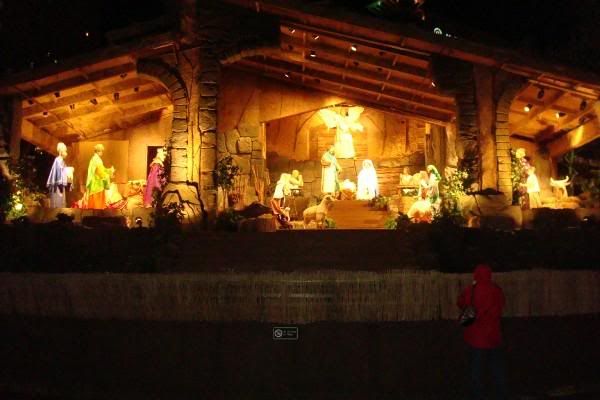
Friday, December 19, 2008
A Holiday Favorite ~ David Bowie and Bing Crosby
;)
It always gives me goosebumps & a very tender heart....enjoy!
An Irish Christmas

Long, long before "Riverdance", ordinary Irish men and women in hobnailed boots knocked sparks off the flagstone floors with jigs, reels and hornpipes, and the rafters rang with the fiery music of the fiddle, bodhran, tin whistle, and the mesmerizing uilleann pipes. Tomáseen Foley’s A Celtic Christmas features Grammy-award winning guitarist William Coulter (www.williamcoulter.com), traditional sean-nós singer and harpist Síle Denvir from Connemara Gaeltacht (Irish-speaking area) in the west of Ireland (www.liadan.ie), world-champion level Irish dancer Katie Linnane on Irish fiddle, and world-champion levelIrish dancer Brian Bigley on uilleann pipes, whistles, and flute.UNQUOTE
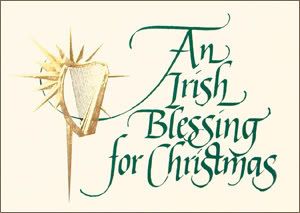
Christ In the Stranger's Guise
Perhaps if we Americans were to become a land which knows the wisdom of "Christ in the guise of a stranger", we would not be so besotten with the idea of finding devils in strangers.
I met a stranger yest're'een;
I put food in the eating place,
Drink in the drinking place,
Music in the listening place;
And, in the sacred name of the Triune,
He blessed myself and my house.
My cattle and my dear ones -
And the lark said in her song,
Often, often, often,
Goes the Christ in the stanger's guise;
Often, often, often,
Goes the Christ in the stranger's guise.
Thursday, December 18, 2008
Odds and Ends
4 cups all-purpose flour
(OR 2 cups rice flour , 1 cup buckwheat flour & 1 cup masa harina & 1/2 tsp xanthan gum for a Gluten Free cookie)
1/2 teaspoon salt
2 1/4 teaspoons baking soda
2 teaspoons ground ginger
1 1/4 teaspoons ground cloves
1 1/4 teaspoons cinnamon
1 stick (1/2 cup) unsalted butter, softened
1/2 cup vegetable shortening
3 1/2 cups sugar
1/2 cup unsulfured molasses
2 large eggs
Preheat oven to 325°F. and lightly grease 2 large baking sheets.
In a large bowl whisk together flour, salt, baking soda, ginger, cloves, and cinnamon. In another large bowl with an electric mixer beat together butter, shortening, and 3 cups sugar until light and fluffy and beat in molasses. Beat in eggs, 1 at a time, beating well after each addition. Gradually beat in flour mixture and combine well. In a small shallow bowl put remaining 1/2 cup sugar. Form dough into 2-inch balls and roll in sugar. On baking sheets arrange balls about 4 inches apart and flatten slightly with bottom of a glass dipped in sugar. Bake cookies in batches in middle of the oven 15 minutes, or until puffed and golden. (Cookies should be soft.) Transfer cookies with a metal spatula to racks to cool.
Wednesday, December 17, 2008
2008 Greek Riots
Amazing photos. From Boston.com.
Words of wisdom: Never, never, never tick off a Greek. Not on anything that matters.
~~~
Christmas Music For You
I really love this one, if you haven't heard it you're in for a treat:
and this one
and a unique version of O Come O Come Emmanuel by Sufjan Stevens
Tuesday, December 16, 2008
Recipe Party!
Yule Log Cookies
Yield: 28 servings
1/2 c Brown sugar, packed
3 tb Butter or margarine; -softened
3 tb Frozen egg substitute; -thawed Or 1 egg white
1 c All-purpose flour
1/2 ts Baking powder
1/2 ts Ground cardamom
1/4 ts Baking soda
1/4 ts Ground cinnamon
1/4 ts Ground cloves
1/4 ts Ground allspice
1/4 ts Ground nutmeg
Red and green decorator -icing
Recipe by: Fast & Healthy Magazine, Nov/Dec 1994
Preheat oven to 375 degrees.
In a medium bowl, beat the brown sugar and margarine until blended. Add the egg product; beat until well blended. Lightly spoon flour into measuring cup; level off. Add the flour, baking powder, baking soda and spices; mix well. Divide the dough in half. On a lightly floured surface, roll each half of dough with your hands to make two 10 1/2-inch logs; flatten slightly to 1 1/4 inches in diameter. With a spatula, place the logs 2 to 3 inches apart on an ungreased cookie sheet. Dip a non-serrated knife in water; score each log diagonally at 3/4-inch intervals. Bake for 11 to 13 minutes, or until set and no longer moist. Cool for 1 minute. Remove from the cookie sheet; place on a wire rack. Cool for 5 minutes. With a serrated knife, cut the logs at the scored lines. Cool completely. Decorate each cookie with decorator icing to resemble a holly leaf and berries. ~ Penny Halsey
~~~~
Monday, December 15, 2008
Infrastructure, Infrastructure, Infrastructure
From The Economist
QUOTE The need is undeniable. Many old industrial cities have rich networks of roads and railways, dating from a time when they were much bigger. These are now crumbling. Last year a bridge collapsed in Minneapolis, killing 13 people. A tunnel that brings water to New York sprang a leak in the 1980s and is currently losing about 20m gallons a day. Philadelphia has been flooded with sewage. The most recent infrastructure “report card” by the American Society of Civil Engineers contains nothing but Cs and Ds.
Matters are even worse in the desert West and lowland South, where population growth has been so rapid that basic infrastructure is often non-existent. Las Vegas (population 560,000) is linked to Phoenix (1.6m) by a rural road that trundles over the Hoover Dam. The West struggles with a water system, built by the federal government in the early 20th century, that serves farmers much better than city-dwellers. The scarcity of power lines is holding up efforts to generate electricity from sun and wind. UNQUOTE
Sunday, December 14, 2008
Where did that Prayer Come From?
Hail, our life, our sweetness and our hope
To thee do we cry, poor banished children of Eve
To thee do we send up our sighs
mourning and weeping in this valley of tears
Turn then, most gracious Advocate, thine eyes of mercy toward us
And after this our exile show unto us the blessed fruit of thy womb, JESUS
O clement, O loving, O sweet Virgin Mary
Among Eastern Catholics there is also disdain for the use of such prayers as the Salve Regina, since it is thought to be of Latin origin. Latinization is a sensitive subject among Catholics of the Byzantine rite. The question is often asked indignantly: Do we not have sufficient --and even superior -- devotions to the Theotokos in our own tradition, that we need to borrow from the West?
Hence it came as a welcome surprise to learn that the Salve Regina is not of Latin origin at all. My pastor recently gave me a copy of An Anthology of Patristic Prayers, compiled and translated by Nikolaos S. Hatzinikolaou. The Anthology ascribes the authorship of this prayer to Saint Isaac the Syrian, a seventh century bishop of Ninevah and one of the great ascetical teachers of the Church, who greatly influenced Saint Symeon the New Theologian and the Russian Mystics as well.
Here is Saint Issac's prayer as translated by Hatzinikolaou:
Rejoice! O Lady, Mother of mercy,
life, sweetness and our hope, rejoice!
To you we cry, the children of Eve in exile.
Upon you we gaze,
groaning and wailing in this valley of lamentation.
Wherefore, go ahead, our defender,
turn your compassionate eyes to us
and with this look show us Jesus
the blessed fruit of your womb,
O sweet Virgin Mary
According to Anthony Mazzone in a recent article in The Remnant (New Wine and Old, A Meditation on the Poetics of the Latin Rite, November 15, 2008), the author of the Salve Regina was most likely Hermann Contractus "the Cripple" who died in 1054. However, we know that Saint Isaac the Syrian flourished in the seventh centry. There can be no doubt then, that Hermann translated St. Isaac's prayer to Our Lady from Syriac into Latin, though not in a slavish manner, and making some notable improvements in doing so.
This is just one example of many treasures of prayer, that have blossomed in the West, but came originally from the East. Indeed, a case can be made that all the prayers of the Rosary, and the Rosary itself, are of eastern origin. Do we then intend to exalt one side of the Church at the expense of the other? Let it not even be suggested! Rather, by making such examinations we intend to show how the Christian East and West compliment one another, need one another, and must learn to appreciate our common heritage; the heritage of all the children of Our Lady, the blessed Mother of God.
Introducing Gabriel Stanford Espedal
QUOTE I am from Honolulu, Hawaii (born November 1, 1951). I grew up in a non-churchgoing family. My parents were of protestant background but did not practice.
I began exploring the mysteries of life as a hippie in late 1966. LSD became my sacrament and marijuana my food for meditation. Thinking myself on the fast track to Buddhahood, I realized this path led to the deadest of dead ends. I quit drugs and was initiated into Transcendental Meditation. From TM I graduated to Zen Buddhism and became a member of the Diamond Sangha of Hawaii.
I first became a Christian on June 3, 1972. I met an evangelist named Cleo at a Jesus People coffeehouse in Waikiki, and after a four-hour conversation decided to receive Christ and be baptized. The baptism took place in the Pacific Ocean.After a study of different churches and their doctrines I decided to become a Lutheran. I also decided to study for the ministry (I was then 21). After finishing a pre-theology course at Bethany Lutheran College in Mankato, Minnesota, I went to Wisconsin Lutheran Seminary in Mequon, Wisconsin, graduating with a Masters in Divinity in 1982.
In July of that year I was ordained a pastor in Wichita Falls, Texas, and served as a Circuit Rider for two missions and several preaching stations.I met my wife Dawn after graduation from seminary; I was home for a month and she was on vacation in Hawaii, and we met in church. We were married on May 11, 1983, and have six children.
I was a Lutheran pastor for nine years. Six of those years were spent in an independent mission in El Cajon, California. But as I continued to study theology and church history from outside of a Lutheran confessional perspective it became clear that there was a major discontinuity between ancient Christianity and the Reformation.
I had long been interested in Eastern Orthodoxy. After several years of reading and discussion with an Orthodox priest friend, I was ready to convert. I was chrismated in the Orthodox Church in July 1991.In 1997 I came to see that the full reality of apostolic Christianity could only be where PETER is, and became a Catholic of the Byzantine Rite.
I expect that some of my writing on the Rosemary Tree will be on the relations of the Orthodox Churches and the Catholic Church. UNQUOTE
~~~~
Saturday, December 13, 2008
Happy Santa Lucia Day

From Wikipedia: QUOTE Saint Lucy of Syracuse, also known as Saint Lucia or Saint Lukia, (Spanish: Santa Lucia) (traditional dates 283 – 304) was a rich young Christian Martyr who is venerated as a saint by both Catholic and Orthodox Christians. Her feast day in the West is December 13, by the unreformed Julian calendar the longest night of the year; with a name derived from lux, lucis "light", she is the patron saint of those who are blind. St. Lucy is one of the very few saints celebrated by members of the Lutheran Church among the Scandinavian peoples (Danes, Swedes, Finns and Norwegians) who take part in Saint Lucy's Day celebrations that retain many indigenous Germanic pagan pre-Christian midwinter elements.[1][2] [3][4] Other notable saints still venerated by Scandinavian Lutherans are St. John the Baptist at midsummer, and St. Olaf, the patron Saint of Norway, at Olsok. St Lucy is one of seven women, excluding the Blessed Virgin Mary, commemorated by name in the Roman Canon. UNQUOTE
Friday, December 12, 2008
La Guadalupana
Muchas Felicidades en tu día SANTA PATRONA DE MEJICO Y DE LAS AMERICAS!
We love Our Lady so much!
A Factory Without Bosses
From Toward Freedom QUOTE It is one of the biggest "recuperated factories" in Argentina with exemplary worker management. It has created jobs, conquered the market, and managed to involve a whole community in its defense against repeated threats of eviction. After long legal maneuvering, a bankruptcy judge decided to hand the factory over to the Fasinpat cooperative in exchange for payment of 30,000 pesos (about $10,000) a month in taxes. It was a big step toward final expropriation and a recognition of the solid work of its 470 workers. UNQUOTE
Here in the United States, we would do well to take notice, in these days of worker layoffs and corporate welfare. The spirit of the factory occupation has extended far beyond the factory walls with the workers contributing to building projects for local schools and the construction of a health clinic in a nearby poor neighbourhood.
Our Lady Of Guadalupe 12/12

This prayer was approved and enriched with an indulgence of five hundred days by Pope Pius X at all audience held on August, 1908, and was included in the official edition of approved indulgenced prayers (1950).
Raccolta number 389, 500 days Indulgence, Pope Saint Pius X audience, August 15, 1908.
QUOTE Why would the Blessed Virgin Mary appearing to a Native American of the recently conquered Aztec empire, and speaking to him in the native Nahuatl language, call herself “of Guadalupe”, a Spanish name? Did she want to be called "de Guadalupe" because of the statue of Our Lady of Guadalupe in Estremadura, Spain?In all apparitions of the Blessed Virgin Mary she identified herself as the Virgin Mary and phrases like Mother of God or another of Her Titles, and was later usually known by the name of the place or region where she appeared (Lourdes, Fatima).
So why should Mary, when appearing to a Native American in recently invaded Mesoamerica and speaking in the local language, want to be named with the Spanish name of Guadalupe?Was she referring to the miraculous statue of Our Lady of Guadalupe, that was given by Pope Gregory the Great to the Bishop of Seville, Spain, was lost for 600 years and was found in 1326 by a cowherd named Gil Cordero guided by an apparition of Our Lady? This statue was named Guadalupe for the village located near the place of discovery.The origin of the name Guadalupe has always been a matter of controversy. It is nevertheless believed that the name came about because of the translation from Nahuatl to Spanish of the words used by the Virgin during the apparition to Juan Bernardino, the ailing uncle of Juan Diego.
Some believe that Our Lady used the Aztec Nahuatl word of coatlaxopeuh which is pronounced "quatlasupe" and sounds remarkably like the Spanish word Guadalupe. Coa meaning serpent, tla being the noun ending which can be interpreted as "the", while xopeuh means to crush or stamp out. So Our Lady must have called herself the one "who crushes the serpent." UNQUOTE
Read more...
Wednesday, December 10, 2008
Pursuing the Goal of Perfect Giving
The practice of gift-giving at the Christmas holidays is said to be in imitation of the Three Kings who came to the stable in Bethlehem bearing gold, frankincense and myrrh for the newborn King, but I like to think of it as being a form of self denial, shopping for and making for others, then making the gift beautiful, swathing it in warm colored paper & tying it up with a bow.
He Who made man also redeemed him by the utterly perfect gift on the Cross, and still does today by the resurrected love which is offered to transform each and every one of us every time we take holy communion. As we pursue the goal of conforming our lives to Christ's and His Blessed Mother's, at this time of year we get a glimmer that they are lives of perfect giving. As we hand each other material gifts this holiday season, let us remember to give ourselves also, in perfect love.
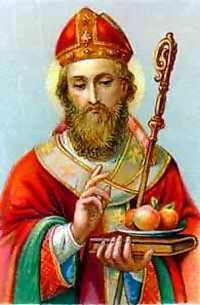
Saint Nicholas
art credit: julius kronberg
~~~~
Tuesday, December 9, 2008
Eleftheria!! Freedom!!
 "A lot of teenagers identify with Grigoropoulos," said Christos Mazanitis, an Athenian journalist. "There's a whole generation out there who see their parents in debt and feel they have nothing to look forward to in the future. Fear and despair are what these riots are about."
"A lot of teenagers identify with Grigoropoulos," said Christos Mazanitis, an Athenian journalist. "There's a whole generation out there who see their parents in debt and feel they have nothing to look forward to in the future. Fear and despair are what these riots are about."Ελευθερία ή θάνατος - freedom or death! is the motto of Greece. It arose during the Greek War of Independence in the 1820s, where it was a war cry for the Greeks who rebelled against Ottoman rule. It was adopted after the Greek War of Independence. It was the motto of a tiny land which resisted the Nazis during WWII, and Oxi Day, (pronounced Oh-hee)literally "NO Day" still is commemorated by Greek people around the world, as the day they said NO to the Nazis and facists. * They suffered greatly for it. It is still in use today, and is symbolically evoked by the use of 9 stripes (for the nine syllables of the motto) in the Greek flag. The motto symbolized and still does symbolizes the resolve of the people of Greece against tyranny and oppression.
So it was not a surprise to me to hear of the massive riots plaguing Greece, especially Athens, where the police recently shot and killed a 15-year-old boy in cold blood. The Hellenic peoples invented democracy and to this day do not like the state very much, especially when it malfunctions badly enough to shoot their children dead. Now, I do not condone violence no matter who does it, but as always, I commend the Greek people on once again saying Oxi!! No!!
to the simply unacceptable.
From Breitbart.
QUOTE Massive riots first erupted Saturday across the country, from Thessaloniki in the north to the island of Crete in the south, after 15-year-old Alexandros Grigoropoulos was fatally shot by a police officer in Athens' often volatile Exarchia district.
The circumstances surrounding the shooting are unclear, but the two officers involved have been arrested; one has been charged with murder and the other as an accomplice. A coroner's report shows the boy was shot in the chest.
Schools were to shut Tuesday in mourning, while staff at universities declared a three-day strike.
The Police Officers' Association has apologized to the boy's family, and President Karolos Papoulias sent a telegram to his parents expressing his condolences.
"All the dangerous and unacceptable events that occurred because of the emotions that followed the tragic incident cannot and will not be tolerated," Karamanlis said in a live televised address Monday morning. "The state will protect society."
But his calls for calm went unheeded and the scenes of destruction are likely to further dent the government's popularity. UNQUOTE
* Wikipedia: This ultimatum, which was presented to Metaxas by the Italian ambassador in Greece, Emanuele Grazzi, on October 28, 1940, at dawn (04:00 AM), after a party in the German embassy in Athens, demanded that Greece allow Axis forces to enter Greek territory and occupy certain unspecified "strategic locations" or otherwise face war. It was allegedly answered with a single laconic word: όχι or no. Most scholars dismiss the use of the word 'Okhi' as an urban legend, claiming that the actual reply was the French phrase "Alors, c'est la guerre" ("Then it is war"). In response to Metaxas's refusal, Italian troops stationed in Albania, then an Italian protectorate, attacked the Greek border at 05:30 AM. Metaxas's reply marked the beginning of Greece's participation in World War II (see Greco-Italian War and Battle of Greece).
On the morning of October 28th the Greek population took to the streets, irrespective of political affiliation, shouting 'okhi!'. From 1942, it was celebrated as Okhi Day.
Deborah Yost
####
Thomas Woods Interview

Monday, December 8, 2008
The Reason For the Season

Christmas Day 2008 is nearly upon us, and at Midnight Masses across the country, Catholics will soon sing "Joy to the world / the Lord is come!" In Eastern Rite Catholic churches, the refrain is a little different, and yet still the same: "Christ is born! Glorify Him!"
Our Advent wait is nearly over; Christ is to be born in Bethlehem. God's plan of salvation rests on this tiny Child, who contains the whole of the Godhead in His wondrous human Body. As we celebrate His Birth, we remember that we still await His Second Birth. In that sense, our Advent continues after Christmas, though it is an Advent filled with joy, as we strive every day to model our lives on Him, and on Our Lady, with the help of His grace.
Throughout the Divine Liturgy for the Feast of the Nativity of Our Lord in the Byzantine Catholic Church, the people sing:
God is with us! God is with us!
Understand all ye nations
And submit yourselves to Him
For God is with us!
That is our Advent & Christmas hope.
~ Deborah Yost
~~~
Freedom of Choice Act

photo credit: Kaydra 23
John Medaille over at The Distributist Review says:
QUOTE I believe that we should all protest this document, and let the Obama administration know the depth of the opposition to such radical pro-abortion policies, policies that would not only commit tax dollars to immoral policies, but which would force private citizens to subsidize abortions from their own funds. It is inconsistent for the left to treat this as a matter of conscience and then outlaw any dissent, which is what this document calls for.
But what should be our response? Obviously, what we would like is that all abortions be banned and all children be cared for. However, this is possible even with a Republican administration. According to a Fox News Poll, only 9% of Republicans consider abortion as an important issue. Indeed, according to a poll done for the Knights of Columbus, 50% of nominal Catholics consider themselves to be pro-abortion. And it is simply unreasonable to think that a Democratic administration would even consider outlawing abortion. Indeed, mild limitations on abortion failed in the last election in the Red State of South Dakota. So even among Republicans in Republican states, there is little chance of getting abortion outlawed.UNQUOTE
Be sure to click on over and read the entire article.
Also check out:
Towards A Comprehensive Pro-Life Meme by Deborah J. Yost
~ Deborah Yost
~~~~
Sunday, December 7, 2008
Sunday Morning Ramble

Wisdom from the Old Ranger
QUOTE If there was one thing that I took away from my tour of duty with the Rangers it was a defiant attitude in the face of crisis and disaster. We had a saying we used to tell each other when things got really tough. "Ranger, you've got to be tougher than woodpecker lips". It was kind of stupid but it had the effect of reminding us of the proper attitude to have when things really got ugly. We used to practice the proper attitude every morning also. There was an old Vietnam era Ranger who used to stand out in front of the barracks every morning before PT. About five min before first call he would yell at the top of his lungs for everyone to hear "Rangers" Its a great day to die!" I like that attitude. UNQUOTE
~~~
Saturday, December 6, 2008
Remembering Saint Nicholas
Fear not, I won't rehearse details you'd find in a book of Saint's lives; rather I'll relate a legend well known in Russia: The Tale of St Nicholas and St John Cassian.
Once upon a time....
Our holy Father Nicholas and the saintly Elder, John Cassian were sent from heaven to visit the earth. As they journeyed they came upon a peasant with a wagon load of hay, its wheels stuck hopelessly in the mud. The poor man goaded the horses in vain; he was going nowhere.
"Let's go and give the good fellow a hand" said Saint Nicholas.
"Not I; I'm keeping out of it" replied Cassian. "I don't want to get my coat dirty."
"Well, wait for me," said Nicholas, "or go on without me if you like." And plunging without hesitation into the mud he vigorously assisted the peasant in dragging his wagon out of the rut.
When he had finished the job and caught up with his companion he was all covered with filth. His coat was torn and soiled and looked like a beggars rags. Saint Peter was amazed to see him arrive at the gate of heaven in this condition.
"I say! Whatever got you into that state?" he asked. Nicholas told his story.
"And what about you?" asked Peter, turning to Cassian. "Weren't you with him in this encounter?"
"Yes, but I don't meddle in things that are no concern of mine, and I was especially anxious not to get my beautiful clean coat dirty."
"Very well" said Peter, "you Nicholas, because you were not afraid of getting dirty in helping your neighbor out of a difficulty, shall for the future have two feasts a year, and you shall be reckoned the greatest of saints after me by all the peasants of holy Russia. And you, Cassian, must be content with having a nice, clean coat; you shall have your feast in leap year only, once every four years."
It seems to me that this tale teaches us a beautiful lesson about the completeness and perfection of the Christian life. We are obviously not dealing with the historical personages here; Nicholas and Cassian are symbols of two concepts of the life in Christ. Cassian is a man of great prayer and contemplation. He engages in ascetical exploits to keep his soul unstained by the world. But that is as far as he goes. Nicholas is also a man of great prayer and holiness, but he is renowned mainly for his great works of charity toward the poor and suffering people in the world. Neither is wrong; both are saintly men honored in heaven. But one is better; one more completely reflects Christ and is the most beloved Saint in all nations. And since we ourselves are poor folk with our wagon so often stck in a muddy rut, which sort of saint do we need the most? Which sort should we most aspire to become?
Friday, December 5, 2008
New Blogger Coming To The Rosemary Tree
Please join me in welcoming new blogger Gabriel Stanford Espedal to The Rosemary Tree. Hooray! In adding a new voice I hope to deepen the content here and provide materials to support fellow truth-seekers, both Catholic and otherwise, in their walk through these troubled times. We are here in service to Our Lord and Lady, and our fellow man.
Please comment and add your ideas and suggestions to our posts.
Gabriel is someone I've "known" online on several traditional Catholic forums over the past two years. He is a fine writer, a devout and articulate fellow Melkite, and a family man with a wife and six children. He will start his blogging tomorrow, on the Feast of Saint Nicholas, Wonderworker of Myra.
Welcome to The Rosemary Tree, Gabriel!

Pray For Vocations In Ireland

Thursday, December 4, 2008
Toxic Planned Parenthood
Despite a consistent pattern of lawlessness and abuse, Planned Parenthood, a tax-exempt "nonprofit", made over $100 million in profits last year and has a billion-dollar budget. Planned Parenthood receives over $300 million from taxpayers.Planned Parenthood, a tax-exempt nonprofit, made over $100 million in profits last year and has a billion-dollar budget, nearly a third of which comes from taxpayers through government funding.
Wednesday, December 3, 2008
Red State Eclectic: Back in the Saddle Again

Dreams and Creativity

The Secret History Of Dreaming by Robert Moss
From Amazon.com
QUOTE What do the first major oil discovery in Kuwait, Mark Twain’s fiction, and Harriet Tubman’s success conducting slaves to freedom via the Underground Railroad have in common? They were all experienced first in dreams. Dreaming is vital to the human story. It is essential to our survival and evolution, to creative endeavors in every field, and, quite simply, to getting us through our daily lives. Robert Moss traces the strands of dreams through archival records and well-known writings, weaving remarkable yet true accounts of historical figures influenced by their dreams. With eloquent prose, Moss describes beautiful Lucrecia de Leon, whose dreams were prized by powerful men in Madrid and then recorded during the Spanish Inquisition, as well as the fascinating dream correspondence between Wolfgang Pauli and Carl Jung. The Secret History of Dreaming addresses the central importance of dreams and imagination as secret engines in the history of all things human, from literature to quantum physics, from religion to psychology, from war to healing. UNQUOTE
Make my day, Johns Hopkins white lab coats guys.
Make my day.
From LiveScience.

Tuesday, December 2, 2008
Tuesday Follies

Monday, December 1, 2008
Melkite MIssion of Lincoln
Sunday, November 30, 2008
Rose Prince: Incorruptible

August 21, 1915 – August 19, 1949
Her body remains incorrupt in the cemetery of Lejac, Carrier First Nation
Rose Prince was born on Saturday August 21, 1915 in a small house on a hill in the Carrier Nak'azdli First Nation and behind the convent near Fort James. She was the third of nine brothers and sisters.
Her father, Jean-Marie was the son of the Chief Joseph, Chief of the Carriers of Fort Saint James. His father was the eldest son of Simeon La Prince, who was the son of the great Carrier Chief Kwah. Her father was devout Catholic and went frequently to church. He led the prayers and singing in the church and translated for the parish priest. He was known as the, “Church Chief.”
Her mother, Agathe was one of two children born to Anazel. Anazel died when Agathe was very young. A priest took her to live at Williams Lake and was taken care by the Sisters of the Child Jesus. A cousin of Rose, Evalie Murdock, remembers Agathe’s great beauty. One day, she remembers, “I saw her standing on the hill. She didn’t have her kerchief on her head and her hair was loose. She was standing there with a long dress on. Oh, she was so pretty! I always remember her that way.” .... Miracles have been attributed to her through visiting her grave and taking earth from her grave.
Mabel George, who attended Lejac Residential School when Rose was there, says praying to her is like talking to an old friend and tells of the miracles attributed to Rose. She said a young man had his body cured from a disease after his parents visited her grave. A man was cured of cancer after his wife prayed to her for a week. Another man was able to walk again after three weeks. This was when a Father mixed earth from her grave with holy water and anointed the skin covering his back, and prayed for him through the intercession of Rose Prince. One hour later he fell asleep and woke up the following morning, and was able to walk again.
There is an annual pilgrimage in July to the cemetery where she is buried in Lejac, British Columbia, Canada.
Read More...
The incorruption of bodies is a miracle that reflects the victory of Jesus Christ over death (Acts 13:34-35,37). Among Catholics such bodily incorruption has a very particular meaning. The Church accepts this as a sign from God, which witnesses to a life of great holiness. That is, God might preserve from corruption the bodies of those that had kept their souls in purity, and has freed them from the defilements of the flesh. Thus, these bodies are wondrously preserved from corruption, which is a sign of the presence in this world of God’s Kingdom.Some Saints, or would be Saints have uncorrupted bodies after they have died. The incorruption of the body is when the body does not decay at a normal rate. Many times, years after death, these bodies are found to be lifelike. Also, reported with some uncorrupted bodies is the presence of pleasant penetrating fragrances about them, such as jasmine and honey.



